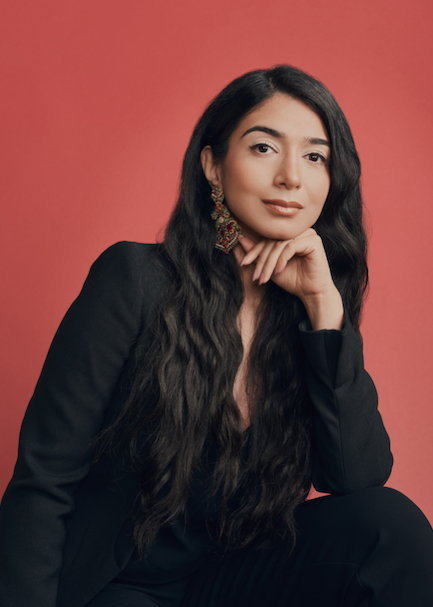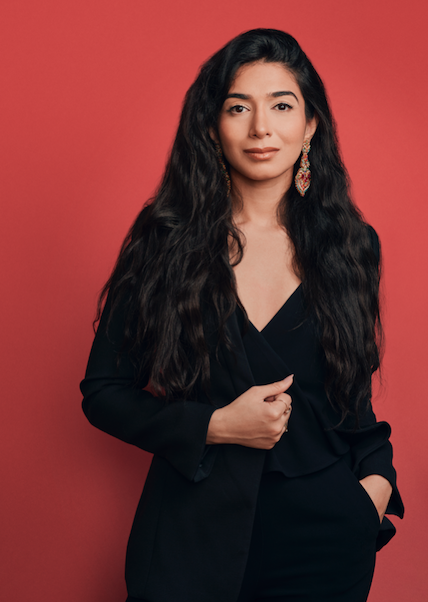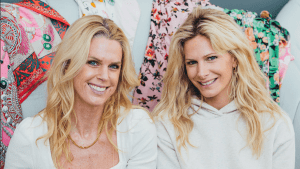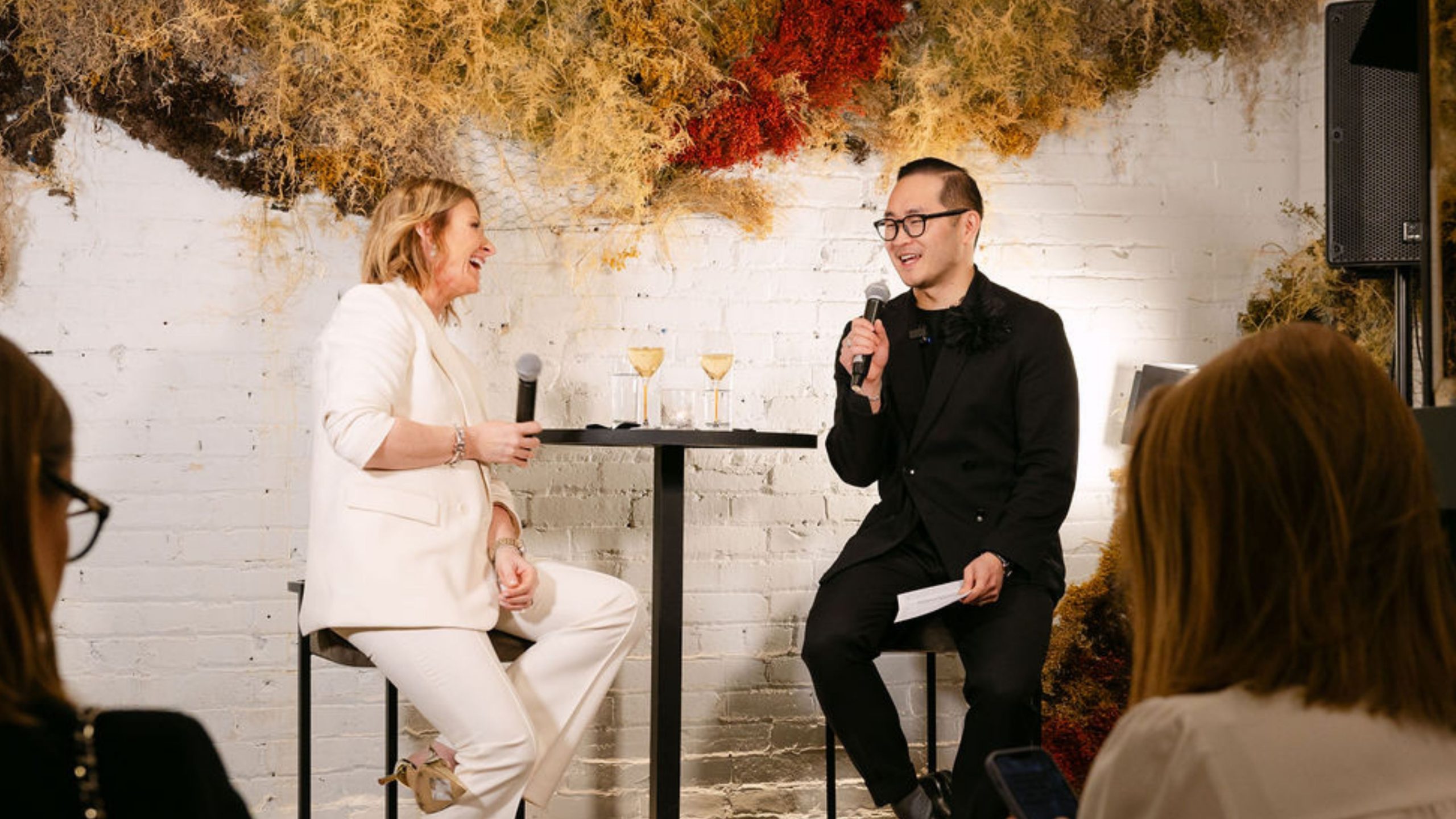Food has always been a powerful way of exploring themes beyond its function as a means of sustenance. Think about the best meal you’ve ever had or your fondest food memory. Chances are they involved being in the company of others by breaking bread or engaging in long-held traditions. Food is culture—it brings people together, cements our most cherished memories, promotes powerful dialogue, and forces us to ask important questions about ourselves and our communities.
It is through this perspective that entrepreneur Shiza Shahid created her company, Our Place. You may recognize them for their buzzy social media campaigns and kitchenware essentials that promise to make everyone’s lives easier. But beyond that, Shahid’s LA-based company has inevitably ignited meaningful conversations around racial identity, culture, and equality by inviting others into the kitchen.
“When you come into my kitchen, you won’t just know who I am. You’ll know who my grandmother was,” says Shahid. “That is the power of home cooking. It is fundamentally linked to where we came from, what happened to us, and what we did with that, to the issues that we care about today around immigration, justice, and belonging. Our Place is a brand that’s about culture and connection.”
Building a mission-focused company isn’t new to Shahid. Before Our Place, the Pakistani entrepreneur co-founded the Malala Fund alongside Nobel Peace Prize laureate Malala Yousafzai to provide better access to education for girls around the world. She also built her own investment company (NOW Ventures) that focused on supporting mission-driven and women-founded startups. Throughout her career, Shahid has devoted herself to not only creating more seats at the table but to building bigger, more inclusive ones altogether—all in an effort to provide others (women and people of colour, in particular) with a voice and opportunities of their own.
According to a 2021 international barometer on women’s entrepreneurship conducted by Veuve Clicquot, research found that while the number of women entrepreneurs in Canada is growing (24 percent in 2020 compared to 17 percent in 2019), women continue to face gender-based challenges when it comes to starting and building their own businesses—challenges that Shahid has faced, herself. In a poll of 2004 respondents, 75 percent of women entrepreneurs reported that they expected to face more criticism than their male counterparts, and 45 percent believed that gaining access to funding seemed harder for women than men.
“People who look like us and have our backgrounds typically do not get to build businesses in this industry,” says Shahid. “I know that people will walk into rooms with investors who look like them, who they grew up closer to, and can probably get a cheque a lot easier from than I can. It’s not okay or how things should be, but my focus is on doing what is needed to bring our vision to life.”
Below, Shahid discusses her experience building Our Place, the best way to support other women entrepreneurs, and her fondest food memories. Read or listen to the Mission Critical podcast episode below.
Glory Professional: How has food played a role in your life?
Shiza Shahid: Food is so important in my life. It’s a complex question for me. My mother never taught me how to cook because she grew up in a very traditional family in Pakistan at a time, place, and culture where she was told she would not get to pursue her career or higher education—that her only options in life were to be a wife and a mother. She married my father when she was 19 years old and met him for the first time on their wedding day. My mother’s an incredibly strong and powerful woman today. She runs an orphanage and [my parents] have a very equal partnership. She definitely found and made her place despite all of those disadvantages. From the beginning, she wanted something much different for my sister and me. The way that she expressed her love was by keeping us out of the kitchen. Not only did she not teach me to cook, but she would also tell me not to come into the kitchen if she was cooking. She didn’t want her daughters to go through life the way that she did.
The kitchen and domesticity cut her dreams short. It was a tremendous act of love, but then I moved halfway across the world with no family, no aunties to drop off food, and I couldn’t feed myself. I felt deeply disempowered, unwell, and disconnected from my heritage. I missed my mother and I wanted her food, her cooking. So, I went on this journey of learning how to cook. It didn’t come naturally. Everything felt very professional and European chef-inspired. Nothing was good enough. The kitchenware and homeware industries have, for a very long time, ignored, misrepresented, and co-opted the innovations and genius of communities of colour. They have often painted our cultures with a single brushstroke and from a product design perspective, it felt like there was nowhere for me to go. I felt like I couldn’t see myself or my traditions, so that was really why we started Our Place—to create a brand that celebrated all of our traditions and had space for all of the different ways in which we eat and gather.
Glory Professional: What is your most special memory around food?
Shiza Shahid: You know, I grew up in Pakistan. It’s a culture where food is very important and I think that’s true of most cultures. It’s one of the most universal things. It’s also a place where most food is still handmade and very seasonal. It’s farm-to-table because refrigerated trucks are very expensive in most places in Pakistan. Everything that we ate flowed with the seasons and there was mango season in the summer. Pakistan has some of the most delicious mangoes ever. There are rituals around the foods that we eat and one of my favourite ways of eating a mango is this very social way of eating it that’s also very messy.
Another one of my favourite traditions was fresh roti. Twice a day, we would take flour and water, mix it together, and make bread. The moment it comes off the stove, you get this piping hot, fresh bread along with the love and attention to detail of it. A lot of my memories of growing up are around food and just taking the time to cook versus how I spent my early years in the US, which was eating out of boxes in front of the TV.
I think the root of so much of the disconnection that we feel today, and, in fact, so much of the lack of wellness that we feel today comes from not taking a moment to make something with your hands, know where it comes from, and share it with someone you love. That’s why at Our Place, we’re not about making you into the best chef or teaching you how to make a really complex, perfect meal. Just make something with your hands, source it thoughtfully, and share it with someone you love.
Glory Professional: Our Place is not a brand that is afraid to speak about its mission and values. How do you think the way we talk about food and how we cook can be an act of protest or activism?
Shiza Shahid: How could it not? For us, we never went in saying that we’re going to talk about reparations when we talk about vegetables, right? But how do you not? Because when you start to have a conversation about a recipe, the next question is, where does this recipe come from? Who taught us how to cook in this way? And then, where do the ingredients come from? Who taught us how to farm in this way? Have those people and their contributions been acknowledged? Are they able to continue making that food in the ways in which everyone should be able to access fresh and healthy food? We never set out with an agenda, it was just talking about food and whether we are brave enough to follow the conversation where it leads. When is it our place to use our platform? That’s what we’ve done. Food is inherently connected to everything—our identities, our lands, our ancestry, our histories, our innovations—and has been used as a way of protest for a very long time as well.


Glory Professional: How did you advocate for yourself and your vision as you were building Our Place?
Shiza Shahid: Building Our Place is the most beautiful, most rewarding, most joyful, most difficult thing that I have ever done. It’s certainly very hard to do what we do. We have a big vision. We’re doing things differently. People who look like us and have our backgrounds typically do not get to build businesses in this industry. I don’t go into the world expecting fairness. I know that people will walk into rooms with investors who look like them, who they grew up closer to, and can probably get a cheque a lot easier from than I can. It’s not okay or how things should be, but my focus is on doing what is needed to bring our vision to life.
RELATED: These 3 Female-Founded Lifestyle Brands are Focusing on Kitchenware
There is unfairness in the world and that is something that I’ve always known. It’s something that I’ve combatted personally, whether through my work for girls’ education with the Malala Fund, or my work as an angel investor, where I’ve invested in women-founded businesses and done my best to support them. I try and focus on knowing that it’s going to be a fight and it’s not going to be easy. What drives me is this incredible love and belief in what we’re doing and in the team. I don’t do this alone. There is a real sense of a mission that we’re working towards and that’s really all that matters.
If you’re building something, it will be hard. Having a sense of mission that drives you when things are hard (as they will be) and having a group of people that you can count on and fight for will help you get through those obstacles.
Glory Professional: A glance through your resumé shows that you are the founder of the Malala Fund and NOW Ventures. What did you take from those experiences that helped you set the course for what you’re working on now?
Shiza Shahid: When I started the Malala Fund with Malala Yousafzai and her father, I was the founding CEO and built that organization with them. To date, they do some incredible work helping girls in some of the most vulnerable communities around the world get an education. I learned a lot from that experience but one thing I really took with me was the power of a story to shift culture and inspire change. Malala’s story and her courage was such a source of hope for so many people. Very often, when we hear statistics, we can get deeply overwhelmed—130 million girls around the world are out of school, millions more suffer unspeakable violence. Those statistics can overwhelm us and shut us down. But when people hear Malala’s story and her voice, there is a direct connection to this brave, smart, brilliant, sweet girl who just wanted to go to school.
From there, we could give people really tangible ways to have an impact. You can donate, you can advocate, you can sign a petition, you can volunteer, you can write. Taking a story that brings people in and gives them ways to make their efforts count—I really learned how to do that in the work that I did with Malala. Fundamentally, Our Place is a place where we tell our stories today. If you go on our Instagram channel, in the last year we told stories of 34 traditions and celebrated all of them equally loudly and joyfully. When we tell our stories, I think the impact of that is breaking down barriers. We live in a world today where we are scared of others. We’re scared of people who don’t look like us. We’re scared of immigrants. We’re scared of anyone who feels like the Other. There is an incredible power in sitting across from someone, hearing their stories, and realizing you’re actually far more connected than you imagined.
Glory Professional: What do you think is the best way to support women as entrepreneurs and business owners? How would you like to have been supported as you were building your company?
Shiza Shahid: There’s a lot of talk about empowering women. Women are empowered, they’re just not enabled. I know how to run my business. Just don’t stand in my way. Don’t impose a double standard on me and other women that you don’t towards men. There’s a lot of, “we’re going to empower women.” No, just write a check and let women build in the way that we let men build. We need less mentors and more sponsors. Mentors are people who give you advice, sponsors are people who go into the boardroom and say, “she’s awesome. Give her that promotion, hire her, and invest in her.” That’s what women need. We need action versus lip service.
I also think we need to let women be human. There is this expectation when a woman succeeds that she’s never going to mess up, that she’s going to be perfect, that she’s going to cure all of the world’s problems and all of the patriarchy because one woman finally managed to get to an IPO without people standing in her way. Building businesses is hard. Women will fail just like men fail and be human and imperfect. We need to allow space for that and expect it because we’re holding them to impossible standards and waiting for them to fail. That’s a lot of what the ‘Girl Boss’ culture has created. Invest in women, don’t stand in their way, and allow them to be human. Don’t wait to pounce when one woman does mess up and point to that as an example of why you were right in the first place to not give women that space.
I see women crushing it every single day. Our Place’s team is primarily women. We’re also primarily BIPOC, immigrant, or first generation. It is one of the most dynamic, creative, brilliant groups that I have ever had the privilege of being a part of. So, it is happening. Women are out there and they’re doing it despite the obstacles. It is absolutely harder to do what we do, but they’re doing it. We just have to make more space for that.
Glory Professional: It’s true, there tends to be a lot of lip service that we see during these big “moments” throughout the year.
Shiza Shahid: It cannot be a marketing tactic. The question is, what are you willing to sacrifice? Are you willing to move over a little bit so that there’s space for me to sit at the table? Or am I going to have to drag this chair up and force an opening here? I think these moments are important because our stories are often not given the space that they deserve. And if you can’t see it, you can’t be it. I had never heard the word entrepreneur before and I was fortunate to get a scholarship to Stanford university when I was 18. That’s how I moved to the States that was funded by an incredible woman, a philanthropist who’s become a dear friend who believed that a little girl from Pakistan from a middle class family deserved to experience an education that I could never in my wildest dreams have afforded. That completely changed my life.
Glory Professional: Obviously, another big point of conversation throughout the pandemic is how we can support parents in the workplace, which has been a huge challenge, especially for women who often end up taking the brunt of the at-home responsibilities. How do you think parents can be better supported?
Shiza Shahid: The pandemic has certainly had a very negative impact on so many people—girls, women, mothers, communities of colour. It’s become even more important that we need to build places that allow people to thrive fully. For women and men, that means work. That means family. That means hobbies, interests, personal goals, and children. At Our Place, we have built a team of the smartest, most creative, brilliant, and compassionate people we could find and brought them into this community of ours. There is no way that we could do that or retain our amazing talent if we weren’t building a place that allowed people to thrive as their whole selves and considered the realities of being a working mother, father, or caregiver in any other way.
So many of us look after our parents or other family members who are unwell or who need support. I think remote work has helped in offering that flexibility. At the same time, I think connection remains incredibly important. At Our Place, we’ll try and organize dinners when it’s safe; we’ll cook together, we’ll have retreats and really foster those moments of connection.


Glory Professional: What does impact mean to you? Where do you think you’ve made the biggest impact?
Shiza Shahid: Impact is not one thing, it’s everything. I think when we look at Our Place and how we’ve thought about impact, I think of it as Impact 2.0. Impact 1.0, in my opinion, was the TOMS shoes model, where you buy a shoe and give a shoe to somebody in need—it’s the one-for-one model. I think those models were really important in making the consumer aware that, in fact, they had a choice to support a brand that perhaps more closely aligned with their values. However, consumers are savvy and ask questions about your environmental footprint, your diversity and culture, and the materials that you use. They want you to tell them about the real impact of the choices they’re making.
At Our Place, we think every choice is a chance to do a little bit better. We’re certainly not perfect, but we try really hard. That means everything from the composition of our team and the culture that we build to the materials we use. We package our products in fully biodegradable materials that have been designed to minimize waste. We offset our carbon footprint; we’ve been doing that since the first year in business by supporting reforestation projects. We source our products thoughtfully and sustainably. In fact, most of our products today are sourced from women-owned factories and collectives. We give back on a range of issues from food justice to immigration reform. For us, we think that every choice is a chance to do better. Who’s in front of the camera? Who’s behind the camera? What are the words we’re using? What impact do those words and images have on culture and who feels seen? That’s how we think about our business. We’re always trying to do better.
Glory Professional: What is your mission?
Shiza Shahid: I was born into a life where the opportunities that I have today should never have been available to me. I know that many women in my country do not get to go to school, let alone pursue their careers and build businesses. I feel very grateful for the life that I was able to create but I also feel a sense of responsibility to look around the table and see who’s not there and make it a little bit easier for them to have a seat. Our Place is my manifestation of that. It is a business that is rooted in building a bigger table and making it easier for people to share meals, break bread together, and feel seen and exchange stories. That’s what we’re doing one meal at a time. It’s in our name—Our Place. Whose place is it? What does it mean for a place to be truly ours? Is it our place to speak up? Who’s welcome at our place? These are the questions that are inherent to our very existence and we ask them through the work we do with the recipes we write, the products we create, and the stories we tell.













